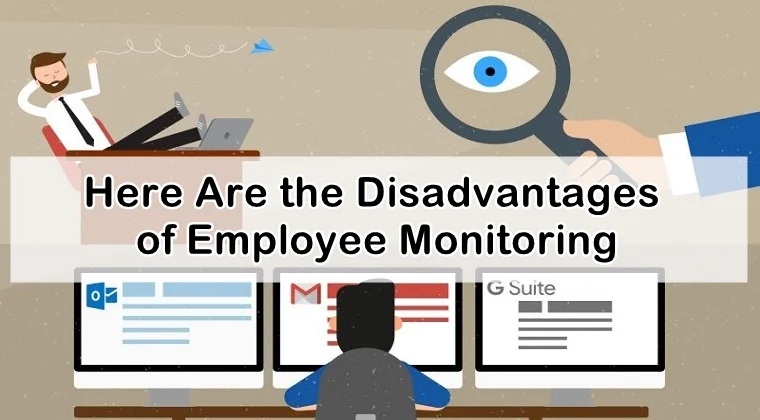Here Are the Disadvantages of Employee Monitoring

Every employer needs to have some sort of employee surveillance in the workplace. It is important to monitor employees’ activities during working hours. Employee monitoring does not mean to be a negative assessment. Every employee regardless of them being productive and dedicated needs to be monitored.
Employee monitoring has several advantages for the company. With employee monitoring solutions, employers can know everything about their workforce. They can find out who does and who does not remain focused on the job and put in efforts for the company’s progress.
While employee monitoring brings a bunch of benefits to the company, at the same time, it also brings a host of disadvantages. In this post, we will learn about the disadvantages of employee monitoring.
The Disadvantages of Employee Monitoring
You may have read several articles that discuss the pros of employee monitoring. It’s good to consider the advantages of employee monitoring before you can think of deploying some monitoring software in the workplace.
However, you should also take a look at the cons of employee monitoring because they are real and very much present. There are some issues that need to be considered by the employer once they decide to deploy the employee monitoring tools in the workplace.
Here are some of the disadvantages of employee monitoring:
Impact on Employee Trust
The presence of employee monitoring tools in the workplace can jeopardize your employer/employee relationship because employees will feel that you do not trust them enough. Employee monitoring policy can hurt your employee and also strongly impact their trust in you as an employer.
Employees who have been working for a long time in the company can feel hurt when you go ahead and install the monitoring software on their devices. Therefore, this can ruin your relationship with your trusted employees and they can lose their confidence in you.
Decrease Employee Motivation and Commitment
It is true that employees do not like to be monitored. If an employer is keeping a keen eye on every action and movement an employee makes, then the employee would not feel motivated and committed to doing anything but may try to look for another job in their free time.
If an employee feels uncomfortable with the presence of employee surveillance in the workplace, he might try to find another job and leave the company which can lead to an increase in employee retention.
Invasion of Privacy
It is important to check the laws and regulations related to employee monitoring that exist in your country/region. Before taking a look at the employee monitoring laws, no employer should pursue them.
Employees are extremely conscious about their privacy and would not like employers to invade their privacy, especially after working hours. Employers should seek employees’ consent before monitoring their work and implementing employee monitoring policies. Only work emails should be monitored and personal emails should not be tracked.
Employee Monitoring Can Be Costly
Employee monitoring comes at a high cost. No employee monitoring software is free except for the trial version. After the trial ends, you need to purchase the premium version of the monitoring software. To implement an employee monitoring tool in the workplace, you need to make an investment.
Apart from spending funds on purchasing the employee monitoring software, you also need to hire someone who will be looking after the data which is being collected by the software. So, the increase in staffing costs is also evident with the use of employee monitoring tools.
Hiring Staff for Monitoring
This is a valid question: who is going to watch the watchers? When you hire someone to monitor the other employees and collect their data with the help of employee monitoring software, you also need to watch that particular person and collect his/her data.
If you are running a large organization, you would need to hire a large team that oversees the other employees, monitors their activities, and collects their data. Eventually, you would also need to hire another team that watches the watchers. So, this can lead to an increase in staffing costs.
Discomfort in the Workplace
Employee monitoring may result in causing discomfort in the workplace. Due to the presence of employee monitoring tools, employees may feel nervous, take extended leaves, or even leave the company and join somewhere else.
When this happens, the business’s performance suffers drastically. There can be a decrease in employee productivity which can affect the overall progress of the company. When you think of deploying monitoring solutions in the workplace, you need to consider your employees and how they are going to react to your actions. You should think about their reaction towards monitoring and whether or not they are comfortable with the idea of monitoring.
Negative Reputation in the Market
No employer would want to gain a negative reputation in the market. Not all employees will be happy with the idea of being monitored all the time. They may take employee monitoring in the negative light and can say bad things about you and your company. This can affect your business when the word of mouth spreads into the public.
If your company has a bad reputation in the market, there is a high chance that you won’t be able to find good candidates for the job vacancies in your company. You may also not get any help from a fellow owner or entrepreneur in your industry. Your employee monitoring can inhibit your business plans and strategies that are required for the progress of your company.
While we have just discussed the disadvantages of employee monitoring, we cannot completely disregard the benefits it can bring for business. Each work environment is different from the other. Depending upon your business environment, you can choose the employee monitoring as you like.
Also, there are workforces that accept employee monitoring without raising a question. Whereas others may completely disregard the idea of being monitored. Therefore, as an employer, you need to make a wise decision when it comes to deploying employee monitoring. Make sure you take your employees in confidence and then take some decision.








